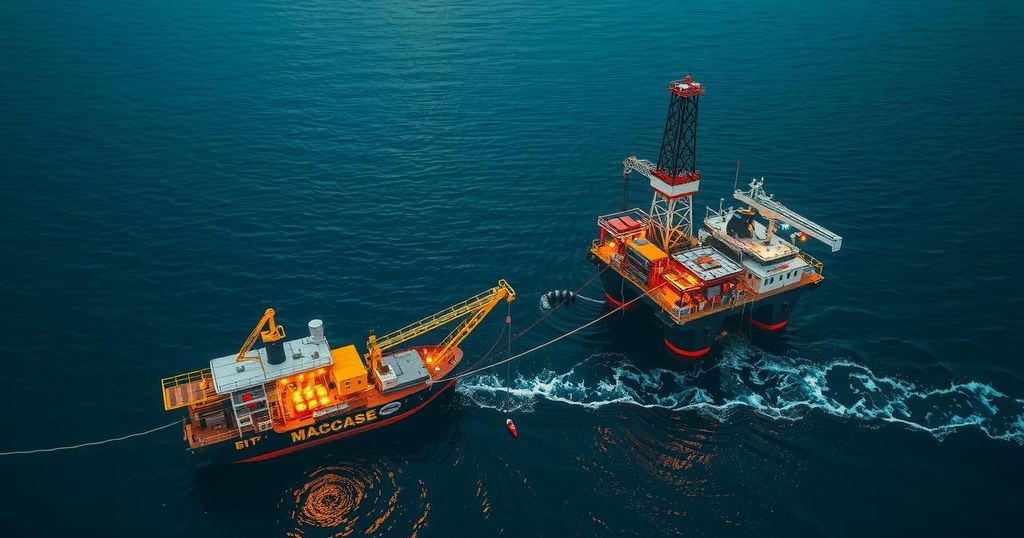Gulf Oil Operators Evacuate Personnel Ahead of Tropical Storm Rafael
Oil companies in the Gulf of Mexico are evacuating personnel due to Tropical Storm Rafael, which threatens significant production losses. Firms like BP, Chevron, and Shell are relocating staff to safeguard against potential disruptions, while Equinor has opted for a complete evacuation and production halt. Rafael is forecasted to impact up to 4.9 million barrels of daily oil production. The storm adds pressure on an already volatile market influenced by geopolitical factors.
Energy companies in the Gulf of Mexico are commencing evacuations in anticipation of Tropical Storm Rafael, which poses a potential threat to their operations. Firms such as BP, Chevron, Equinor, and Shell are relocating non-essential personnel away from platforms, ensuring operations continue for the time being. BP has initiated personnel transfers from platforms like Argos and Thunder Horse, while Chevron is evacuating staff from Big Foot and Petronius, and Shell is taking similar precautions at Appomattox and Vito. In a more cautious approach, Equinor has opted for a total production shutdown and full evacuation. With maximum winds reaching 60 mph, Rafael may escalate to hurricane strength as it moves past the Cayman Islands toward Cuba. However, forecasts suggest it could weaken back to tropical storm status before making landfall on the Gulf Coast. Should Rafael maintain its current intensity, it threatens to disrupt approximately 4.9 million barrels of oil production daily and an estimated 6.39 billion cubic feet of natural gas, as reported by Earth Science Associates. As the 17th named storm of this hurricane season, the frequency of storms—including recent ones like Francine and Helene—has raised concerns within the oil and gas industry. The Energy Information Administration previously warned of up to 25 named storms this season, which may impose significant challenges on the sector. Amid the vicissitudes of the geopolitical climate and upcoming U.S. elections, the potential impacts of Rafael could exacerbate market volatility. As of midday Tuesday, West Texas Intermediate (WTI) crude was trading up by 1.54%, with Brent crude rising to $76.14, reflecting ongoing concerns over supply and production.
Tropical Storm Rafael is the 17th named storm of the Atlantic hurricane season, which has proven to be busy and potentially destructive. The U.S. oil and gas sector is particularly vulnerable to these storms, as they can disrupt significant daily production levels. This season has involved multiple storms that have interrupted operations, prompting energy companies to adopt precautionary measures to safeguard their personnel and maintain extraction activities. The current political landscape and global unrest add further complexity to already fluctuating oil prices.
In summary, the evacuation of oil and gas workers ahead of Tropical Storm Rafael underscores the industry’s ongoing battle against the impacts of severe weather. As companies like BP, Chevron, Equinor, and Shell take proactive measures, including personnel relocations and production shutdowns, the threat to substantial daily oil and natural gas outputs remains a pressing concern. With the season still active, the industry braces for implications on market stability amid heightened geopolitical tensions and supply chain disruptions.
Original Source: oilprice.com




Post Comment